Flash graffiti
« previous post | next post »
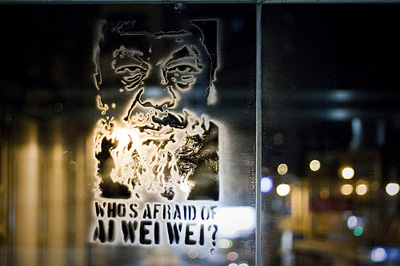 On April 3, the Chinese artist Ai WeiWei was arrested In Beijing as he was about to board a plane for Hong Kong. And according to Natalie Wong, "Mark of defiance as cops chase Ai artist", The Standard 4/20/2011:
On April 3, the Chinese artist Ai WeiWei was arrested In Beijing as he was about to board a plane for Hong Kong. And according to Natalie Wong, "Mark of defiance as cops chase Ai artist", The Standard 4/20/2011:
A young woman going by the moniker Chin Tangerine claims she is responsible for spray-painting images of arrested mainland artist Ai Weiwei on Hong Kong streets and buildings, as the police zero in on possible suspects.
The woman sent pictures of herself purportedly spray-painting the artwork to a Chinese-language newspaper. They have also been posted on the internet. […]
The manhunt by Yau Tsim Mong District Regional Crime Unit and Central District Criminal Investigation Team began after the Ai-inspired graffiti were discovered by patrol officers last week.
Here is one of the photos, which the articles says "showed the woman, with her back to the camera, spray-painting the series of stenciled images, which include the words 'Who's afraid of Ai Weiwei?' in English on pavements and footbridges at night":
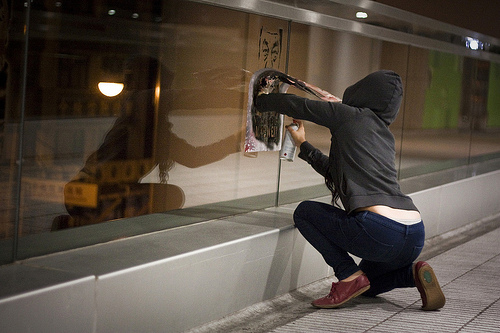
During the past couple of weeks, the image has apparently gone viral, despite the best efforts of the authorities to whitewash it, erase it, or otherwise cover it up. Variants are showing up on posters as well as graffiti:
On t-shirts:
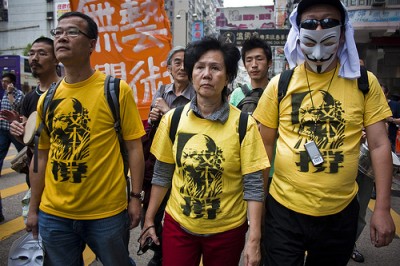
And most recently, according to Bucky Turco, "Chinese Army Unhappy over Ai WeiWei 'Flash Graffiti'", Animal 5/2/2011:
As if Chinese authorities weren’t angered enough by the rash of pro-Ai Weiwei stencils popping up all over Hong Kong, someone is now projecting the same message on unauthorized locations around the city, including the barracks of the People’s Liberation Army. A person using the moniker “Cpak Ming” is then taking photos of the “flash graffiti” and posting them on Facebook, which isn’t necessarily illegal, but has thoroughly pissed off military officials regardless.
Turco's note cites Simpson Cheung and Phyllis Tsang, "PLA in warning over Ai WeiWei image stunt", 4/30/2011:
The People's Liberation Army in Hong Kong has taken the unprecedented step of saying it "reserves its legal right" to act over what it says was a breach of Hong Kong law when activists campaigning in support of Ai Weiwei projected the detained artist's image onto a wall at the PLA barracks in Admiralty.
The image of Ai's face, with the words "Who's Afraid of Ai Weiwei?" was projected earlier this week using a film attached to camera flash.
The "flash graffiti" was also beamed briefly onto other buildings in Wan Chai, Admiralty and Central, including the police headquarters in Arsenal Street and City Hall, and the Hong Kong Heritage Museum in Sha Tin.
A man using the alias "Cpak Ming" who claims on the social networking site Facebook to be responsible for the projected images could not be contacted last night.
I'm skeptical of the "film attached to camera flash" theory — surely some kind of lens would also be needed. And I have the impression that "flash graffiti" originally meant something different… But however it works, I'm in favor of forms of "graffiti" that don't leave public spaces permanently defaced.
The Wikipedia entry cites two theories about why Ai, a successful artist who had seemed untouchable, has been arrested and held for the past month. One involves a somewhat cryptic tweet involving the word "jasmine" (Keith Richburg, "Chinese artist Ai Weiwei arrested in latest government crackdown", WaPo 4/3/2011):
On Feb. 24, amid an online campaign for Middle East-style jasmine rallies in major Chinese cities, Ai posted on his Twitter account: “I didn’t care about jasmine at first, but people who are scared by jasmine sent out information about how harmful jasmine is often, which makes me realize that jasmine is what scares them the most. What a jasmine!”
The other involves a satirical use of the "grass mud horse", discussed in "Franco-Croatian Squid in pepper sauce", LL 3/12/2009 (Michael Sheridan, "Ai Weiwei held for 'obscene' political art", The Australian 4/11/2011):
CHINESE artist Ai Weiwei was detained after an obscene satirical work he drew enraged Communist Party leaders and handed a gift to security hardliners conducting the toughest crackdown on dissent in more than a decade.
International calls for Ai's release have been ignored and there was no official explanation for his detention by police at Beijing airport last week. But rights activists and journalists in Hong Kong say one of Ai's visual critiques of the party crossed a censorship line.
It shows the artist naked except for a toy horse concealing his genitals. The caption has a double meaning in Chinese, so millions of internet users have seen the six characters interpreted as: "F . . . k your mother, the party central committee."
This is the picture, with the caption 草泥马挡中央:

It would have been a fitting turn-about — but maybe simultaneously too obscure and too dangerous — for Chin Tangerine's stencils to have asked "Who's afraid of Ai WeiWei?" in Arabic.
Update — see also Louisa Lim, "Hong Kong Graffiti Challenges Chinese Artist's Arrest", All Things Considered 5/4/2011.
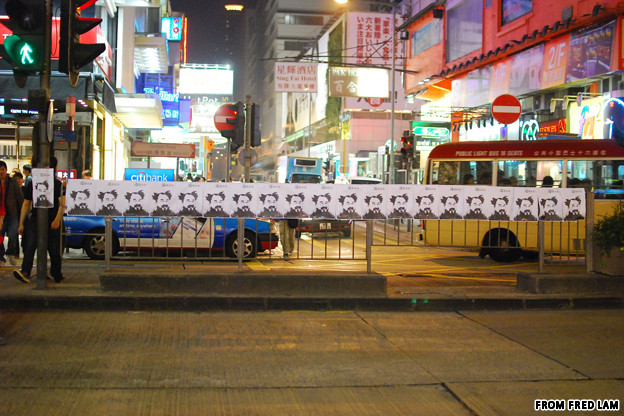
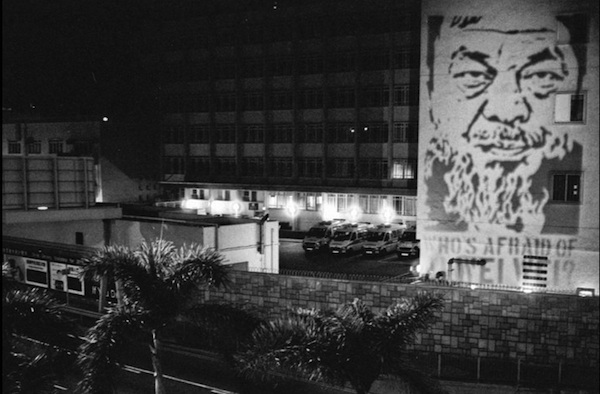
Dunx said,
May 4, 2011 @ 5:46 pm
I like the V mask on the right hand T shirt wearer. Very suitable.
The Ridger said,
May 4, 2011 @ 5:55 pm
That's a horse?
[(myl) Well, it's actually supposed to be a species of alpaca.
And the real thing is less different from the plush toys than you might think. (Though it seems that Mr. Ai, um, straightened his toy a bit for effect in the photo…) ]
Oskar said,
May 4, 2011 @ 6:45 pm
@Dunx: Presumably that means that the guy is a "member" of Anonymous, who have taken to wearing those masks when protesting.
Dan T. said,
May 4, 2011 @ 10:26 pm
The kind of petty crackdowns the Chinese government likes to do only make anti-censorship people angrier, and more prone to escalating their civil disobedience.
Trimegistus said,
May 5, 2011 @ 8:13 am
Send an email (or better yet, write a paper letter) to the Chinese Embassy wherever you happen to be. Make sure they know the world is watching.
chris said,
May 5, 2011 @ 8:14 am
One involves a somewhat cryptic tweet involving the word "jasmine"
Isn't the word "jasmine" also used in describing some of the recent/current Middle Eastern revolutions?
[(myl) Yes, that's the obvious part of the tweet. It's the "What a jasmine!" at the end that I found puzzling.]
Matt McIrvin said,
May 5, 2011 @ 10:39 am
surely some kind of lens would also be needed.
It depends. In the limit of an intense point source of light, you could project a stencil with transparent areas on a large wall and get a sharp image without a lens, even if it's quite close. In practice, a camera flash is not precisely a point source, and the smaller and closer to the flash the stencil is, the blurrier the projected image would be–but the projection in that photo looks pretty sharp. (On the other hand, the stencils used for the spraypaint graffiti are pretty big, which would help. They'd need to be held relatively far from the flash, though.)
I guess you could put a pinhole in front of the flash, but you'd lose a lot of the emitted light.
K. said,
May 5, 2011 @ 12:35 pm
This looks shopped. I can tell from some of the pixels and from seeing quite a few shops in my time.
Eric said,
May 5, 2011 @ 12:44 pm
Even paint won't leave most public spaces "permanently defaced" (just sayin').
Will said,
May 5, 2011 @ 5:44 pm
@K. Obligatory xkcd reference: http://xkcd.com/331
But in all seriousness, what details in particular look photo-shopped about the picture? It looks realistic to me.
The Ridger said,
May 5, 2011 @ 7:28 pm
An alpaca! Well, okay. That I can see.
Smith said,
May 6, 2011 @ 2:20 am
What the "Australian" article does not get into is the other half of the "double meaning" that perspicacious readers are interpreting to mean "F… your Mama, Party Central". The 草泥马 căonímă grass-mud-horse is familiar to LL readers as the homophonic (if dystonal) 操你妈 càonĭmā, but the 挡中央 dăngzhōngyāng is otherwise clever as being both a tonally correct homophone of 党中央 dăngzhōngyāng, the Party Central Committee, and also a perfectly correct phrase in this particular context, where Ai Weiwei is using the grass-mud-horse to cover his " centre". The character 挡 dăng in the place of 党 immediately invokes meanings involving covering, blocking, obstructing, fending off, etc., and the caption thus makes perfect sense as as an innocuous "Grass-mud-horse covers the centre". Indeed, only over-sensitive and twisted apparatchiks would read it any other way! No doubt some see it as a subversive exhortation to all grass-mud-horses to rise up and fend off the Central Committee, blocking its correct action, but that would be over-reading an innocent extract from what I hear is Ai Weiwei's next literary project, a contemporary 三字經 Sānzìjīng children's classic wherein "此動物。草泥馬。能飛走。擋中央。 " Can't wait to read the rest…
maidhc said,
May 6, 2011 @ 3:26 am
I think it's shopped because the photo appears to be taken from a building across the street. The angle of the photo doesn't coincide with with the angle that the image appears to be projected from (why would you go down the other end of the building to take the photo?), and the projection is a suspiciously good fit to the building.
I've taken photos of things projected on buildings at night, and they come out not so much like that. And those were artsy things where the people had all day to get the projector set up right.
Matt McIrvin said,
May 7, 2011 @ 9:27 am
How can you tell what angle it appears to be projected from? The stencil isn't necessarily perpendicular to the beam.
Just another Peter said,
May 10, 2011 @ 12:34 am
@maidhc: "why would you go down the other end of the building to take the photo?"
Maybe to get away from the glare of the flash causing the effect.
Leah Madison said,
May 13, 2011 @ 5:49 am
This campaign is the work of 22-year-old graffiti artist Tang Chin, also known as Tangerine, whose aim is to warn Hong Kong people that Ai Weiwei’s detention does affect them.
“He’s one of the most prominent contemporary art ists in the world right now,” she explains. “And if he can be arrested, then there’s no identity we can hide behind: Being a Hong Kong citizen doesn’t help anymore; being rich or social status doesn’t help. There’s no shield any more against this very naked power that’s trying to engulf us.”
Tangerine’s graffiti campaign has turned her into an inadvertent counterculture icon. Few people know what she looks like. She’s not exactly on the run, but a police unit is investigating criminal damage charges against her, which carry a maximum sentence of 10 years in jail.
Such a stiff sentence for graffiti is extremely unusual, especially since a lesser offense of “graffiti” exists, which carries a maximum penalty of a fine and three months’ imprisonment. Stranger still, the investigating unit is a serious crime squad that usually deals with murder and rape, not vandalism.
Tangerine’s unusual treatment unleashed a furor among Hong Kong’s outspoken press. But she is unfazed, retorting, “I have to thank the police for drawing so much attention to this issue. Even if I have to go to jail, I think that would be a very, very worth it price to pay.”
‘An Issue Of Morality Rather Than Politics’
“For us, this is a big, big alarm,” says local artist Kacey Wong, founder of a new concern group called Art Citizen. He believes recent events are galvanizing and politicizing local artists, who until now have lived in “a bubble.”
About 2,000 of their number marched through Hong Kong’s streets for Ai Weiwei on April 23. Some doused themselves in paint and others drummed, while Wong made his own slyly subversive statement, sitting on the back of a 6-foot-tall homemade Grass Mud Horse, an animal that bears some resemblance to an alpaca.
In his hand, Wong waved a graffiti photograph of a naked Ai Weiwei mounted atop his own Grass Mud Horse. This mythical animal is a political symbol of opposition to government censorship among Chinese Internet users. Its name sounds identical to a particularly obscene profanity, so it is used by netizens to circumvent official censors.
Now Wong fears that political censorship could be spreading to Hong Kong, which he worries could lose its special freedoms if people don’t defend them.
“It’s an issue of morality rather than politics,” says Wong. “I think when you have a chance to voice out, you must voice out before it’s too late.”
And it appears the artistic community at least is paying heed. Now teams of people are downloading Tangerine’s stencil of the detained artist from the Internet, to take on the work of spray-painting it around Hong Kong.
One art activist who calls himself Cpak Ming has even pioneered “flash graffiti”: flashing projections of a supersized Ai Weiwei onto famous Hong Kong buildings for a split second.
His targets included a People’s Liberation Army barracks. The PLA says this is a breach of law, and it reserves the right to act. Ming declined an interview with NPR, saying, “I just want to continue my work.”
But the simple question the graffiti poses is, “Who’s afraid of Ai Weiwei?” And the heavy–handed reactions of Hong Kong authorities do offer one answer: It seems many in Hong Kong’s corridors of power fear the potency of his image.
Jo said,
May 25, 2011 @ 11:34 am
It is kind of funny how all these stunts are in English in a Chinese country.
Goes to show that these people are for the Anglo audience consumption that Chinese.